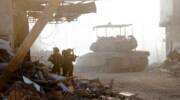Twenty mothers whose fates were intertwined on Oct. 7 embarked on this powerful and transformative journey.
By Hila Timor Ashur, JNS
In a small village on Luzon Island in the Philippines, where the ancient Aeta tribe sustains itself through agriculture, 20 Israeli bereaved mothers arrive after a challenging off-road journey crossing rivers, rocks, and steep ascents.
The mothers lost their children in the Hamas-led onslaught on Israel on Oct. 7, 2023.
As the meeting with the warm-hearted tribespeople concludes, Adva, mother of St. Sgt. Noam Abramovich, who was murdered at the IDF’s Nahal Oz post on Oct. 7, takes the wheel of the jeep and begins the steep descent back.
Suddenly she brakes and asks Tom Rosenthal, the mother of Sgt. Afik Rosenthal, sitting in the back seat, to replace her because the slope seems threatening.
Adva exits the jeep, and I follow to photograph the tropical landscape. She’s forgotten to put the jeep in park, and it begins rapidly rolling downhill with Frida, Tom and Tali inside—all women who lost their children during that Black October.
Sharp screams from Adva and Tom pierce the surrounding silence. In a split second, I must decide—photograph the incident or run after the rolling vehicle to try to stop it.
I choose to abandon my camera and rush toward the driver’s seat, but Frida beats me to it. She extends a long leg and presses the brake pedal. The jeep stops at the fence, a split second before it would have flipped over.
The team exits the vehicle without damage, and now Tom sits behind the wheel.
“Adva, we’ve discovered you’re afraid of dying,” Tom says. Adva replies: “I’m afraid of pain. Be precise.” Tom: “I screamed my soul out. I don’t want to die.” Frida laughs: “Just when I chose life.”
When did you choose life? I interject in the conversation.
Frida: “I haven’t chosen yet. I’m surviving day by day. For now.”
Tom: “At first, I couldn’t even cry. But at Afik’s funeral, I wore white. It was an act of defiance. I won’t be in black.
“During the shivah, a friend gave me the phone number of Shira Yavetz, mother of Yiftah Yavetz, who was killed. Afik died while treating the wounded Yiftah. I called and asked her, ‘Do you want to choose life with me?’ and Shira answered, ‘Yes, yes, yes’ and asked that we video call. Since then, we’ve been choosing life. A good life.”
Adva: “In my previous life, I told myself I could handle anything except the death of a child, which is why I don’t give importance to things like a potential jeep rollover. Nothing happened, we move on.”
Adva: “My Noam wrote, ‘A person is responsible for finding meaning in their life.’ This has become our mission. Our role as parents is to ensure that what happened is never forgotten.”
Frida: “We must not forget what was before Oct. 7. If we don’t do something for unity among our people, it’s as if my child died for nothing. Even if he saved an entire kibbutz, there will be another Oct. 7.”
Why did I say ‘yes’?
Since Oct. 7, 2023, I haven’t left Israel’s borders. I don’t judge those who travel, but I couldn’t enjoy the wonders of Paris while hostages remain shackled in tunnels without seeing daylight. I couldn’t dream of the Northern Lights while our soldiers risk their lives on all fronts.
That’s why I surprised myself when I said “yes” to Yifat Yeger, a psychotherapist specializing in trauma and resilience, who called to ask if I’d be willing to photograph the world’s first off-road journey of bereaved mothers heading to the Philippines.
There are moments when my mouth works much faster than my brain. I agreed to the proposal long before considering what I would need to face.
Because it’s not just about positioning my GoPro in front of a shark’s mouth, or how to photograph four women in a sputtering jeep.
I thought that by listening to and documenting these mothers and their stories about daughters and sons who won’t return, I wouldn’t really be enjoying myself “fully.”
I hadn’t considered what it would mean to listen to 20 mothers who experienced the worst possible tragedy. Some haven’t slept for a year and a half. Others haven’t returned to work. All have a deep hole in their hearts.
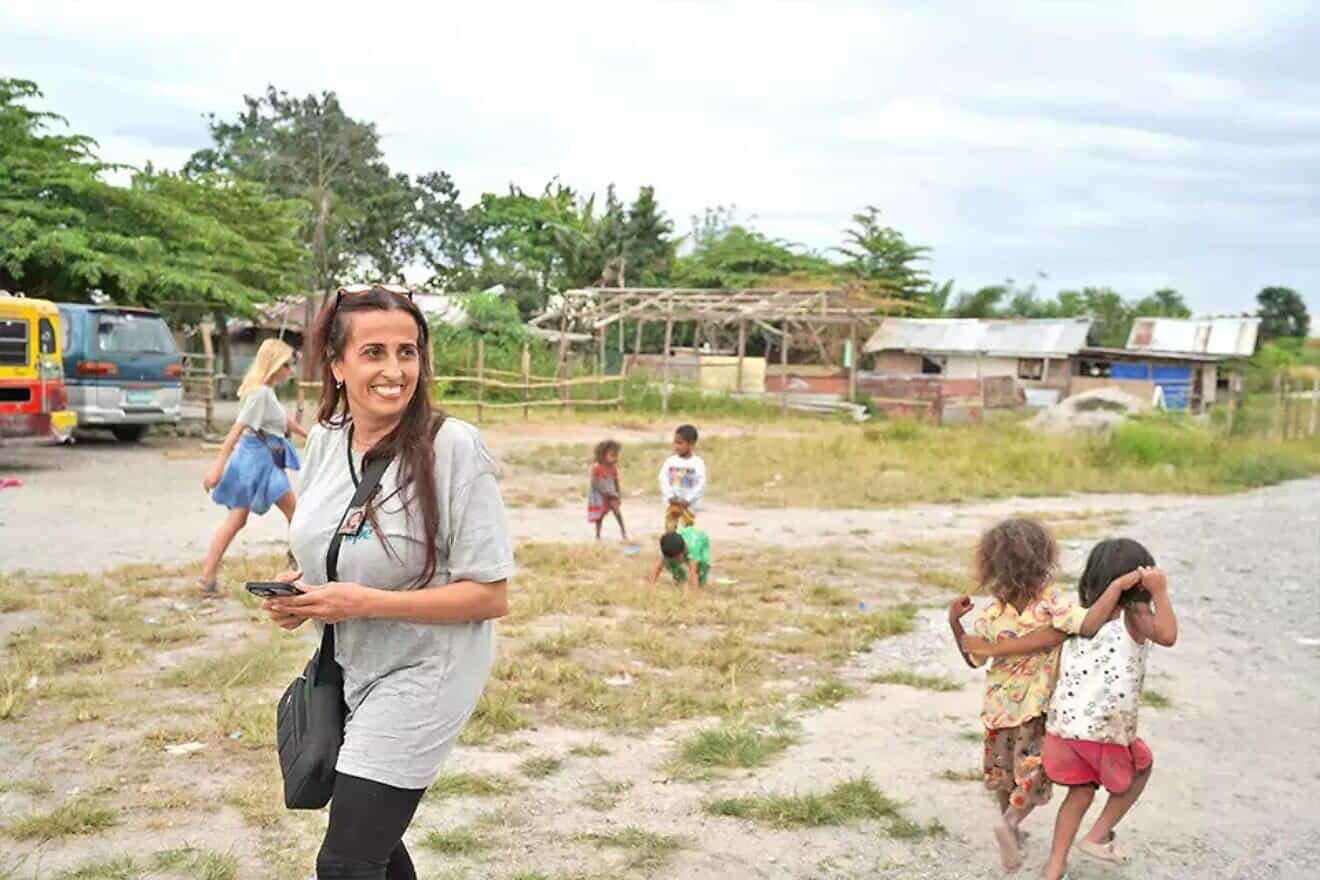
Tzameret Haim Pour in the Philippines, January 2025. Photo by Hila Timor Ashur.
Twenty mothers whose fates were intertwined on Oct. 7 embarked on this journey. Among them were mothers of female IDF lookouts who were in the command center on the morning of the attack and were the first to identify, report, and direct forces: Sharon Eshel, mother of Cpl. Roni Eshel; Tzameret Haim Pour, mother of Sgt. Shirel Haim Pour; Gili Leibushor, mother of Cpl. Yael Leibushor; Tiki Barzilay, mother of Cpl. Osher Simcha Barzilay; and Anat Glass, mother of Sgt. Yam Glass, who commanded the lookout team.

Tiki Barzilay in the Philippines, January 2025. Photo by Hila Timor Ashur.
Joining them were mothers of lookouts who were trapped in a concrete bomb shelter that failed to protect them: Sigal Price, mother of Sgt. Noa Price; Sari Ashram, mother of Cpl. Shay Ashram; Ilanit Cohen, mother of Pvt. Hadar Miriam Cohen; Adva Abramovich, mother of Pvt. Noam Abramovich; Keren Amar, mother of Pvt. Shirat Yam Amar; Ilana Nissani, mother of Sgt. Shahaf Nissani; and Adi Marciano, mother of Pvt. Noa Marciano, who was kidnapped wounded from the shelter and murdered in captivity by Hamas.
They were joined by Sharon Nimri, mother of Cap. Eden Nimri, team commander in the Sky Rider unit, which was armed and fought fiercely against terrorists outside the shelter.
Mothers of other slain IDF soldiers also participated: Shira Yavetz, mother of Cap. Yiftah Yavetz; Shalhevet Harush, mother of Sgt. Ido Harush; Adi Golan, mother of Sgt. Yoni Golan; Tali Mishaelof, mother of Sgt. Gal Mishaelof; and Ilit Ben Nun, mother of Cap. Shlomo Ben Nun.
Twenty mothers. Twenty stories of entire worlds cut short. Longing and indescribable pain against the backdrop of tropical landscapes and physical and emotional challenges.
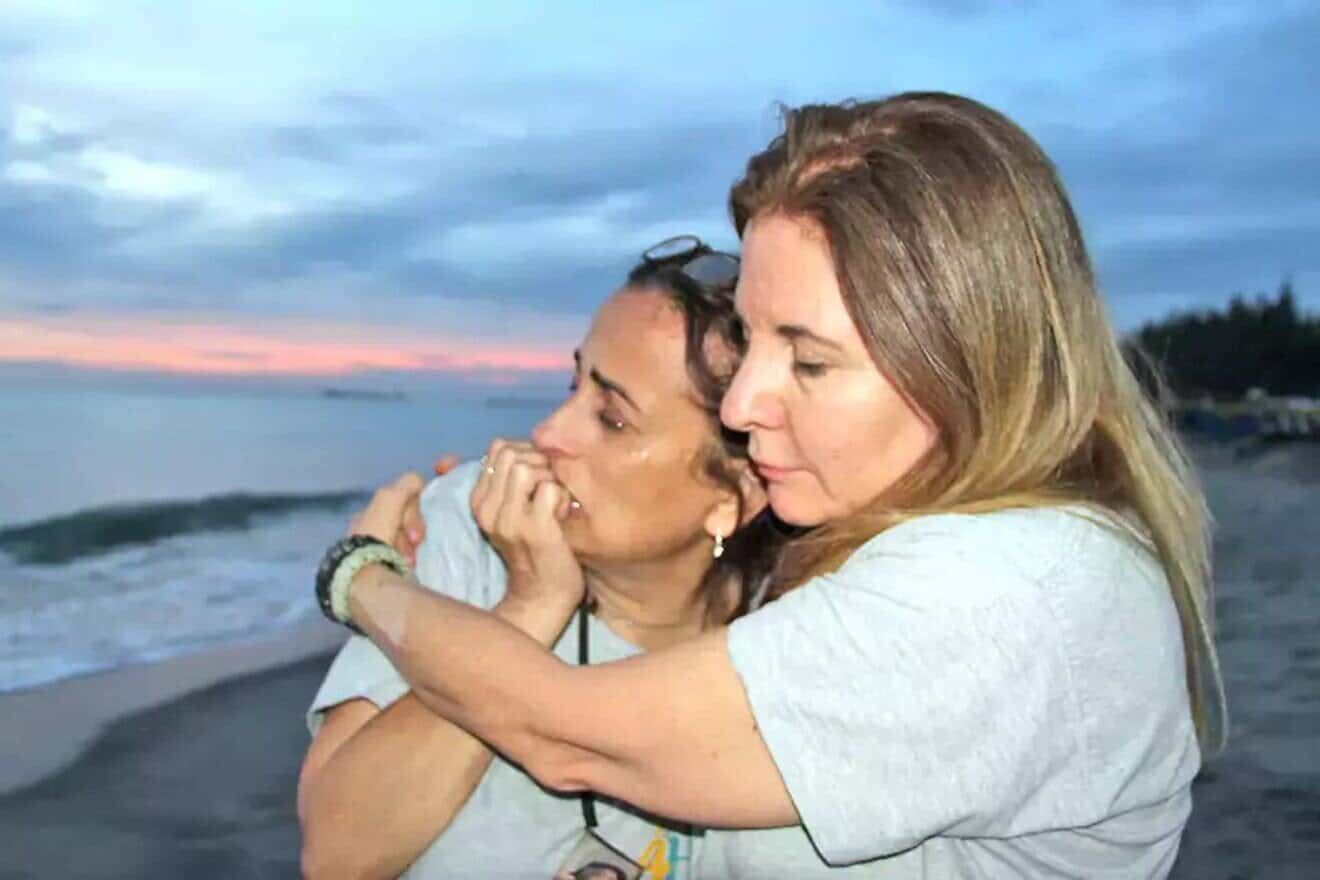
Tzameret Haim Pour (left) and Yifat Yeger, January 2025. Photo by Hila Timor Ashur.
Yeger explains the rationale behind the journey: “One thing that characterizes traumatic experiences is that they sever life. We’re going on a long, continuous journey where everyone who joins will face challenges. My expertise is in journeys that involve emotional and mental processes. This isn’t a retreat or a weekend in London. It’s a long journey. Something happens every day.”
The travel team includes Liat Lehavi, representing Journey4Hope, a foundation that supports the rehabilitation of victims of the Gaza war, Liat Sade-Sternberg, CEO of the foundation, literature doctoral student and guide Noya Sagiv, social worker Dina Promovitz, physician Dr. Drorit Attias and logistics manager Liora Haninovitz.
Magma, a company specializing in organizing off-road expeditions, oversaw the operation.
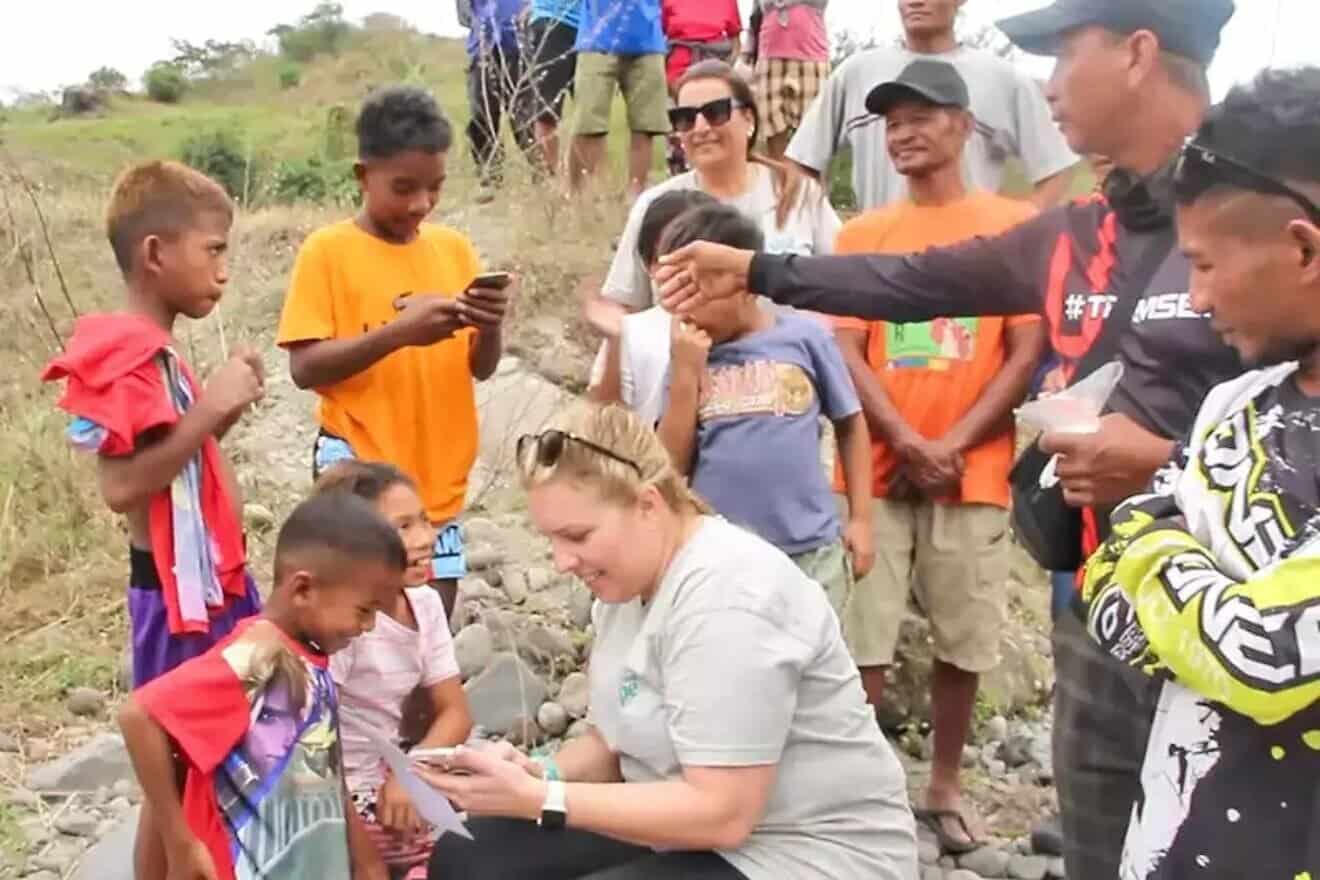
Adi Marciano, January 2025. Photo by Hila Timor Ashur.
It all began when Adi Marciano and Sharon Eshel sat on a bench waiting for their daughters, sisters of Roni and Noa, who were being interviewed for a bereaved siblings delegation.
“Then they thought, ‘Wait, what about the mothers?’” recalls Gili Leibushor, one of the journey’s initiators. “They called me from the bench and said, ‘We need a challenging off-road journey for mothers.’”
Sharon, Ad and Gili, like the other parents of the lookouts, met on Oct. 7 during those difficult hours when they gathered every bit of information about their daughters’ fate. They became a community that initiates memorial activities, promotes investigation committees and social changes.
But above all, it’s a community that supports its members. “It’s the law of bereaved parents, like the law of communicating vessels, so it’s the law of interconnected parents,” Gili explains their strength.
About a month after the phone call where the journey idea was raised, a walk was held in the Gaza border communities. Liat Lehavi, for whose children Yael had babysat, joined Gili on the walk.
Gili: “She asked me, ‘What can I do to help you?’ I told her, ‘We want to go on a journey.’ Liat replied, ‘What do you want to happen on this journey?’ I said, ‘I want to laugh. I’m not laughing. Maybe there’s a chance that in this place I’ll laugh.’”
The Journey4Hope foundation was established by Sade-Sternberg, who explains: “In the army, I was a casualties officer. But what suited bereaved mothers who I knew in the 1990s is not suitable for women in 2025.”
With the foundation’s help, donors were found who understood that these mothers, who for almost a year and a half had only given of themselves to their families and communities, would receive the resilience they needed—and the date was set.
If I had submitted this story as a screenplay, it wouldn’t have passed any review committee. The timing seems artificial.
After months of planning, 20 bereaved mothers take off, 12 of them mothers of lookouts or operations sergeants who died on Oct. 7 in the command center and the shelter from which lookouts Karina Ariev, Naama Levy, Liri Albag, Daniella Gilboa and Agam Berger were kidnapped.
The day before the flight, four of the captive lookouts returned to Israel from Gaza, while Berger would be released when the mothers were in the midst of their journey.
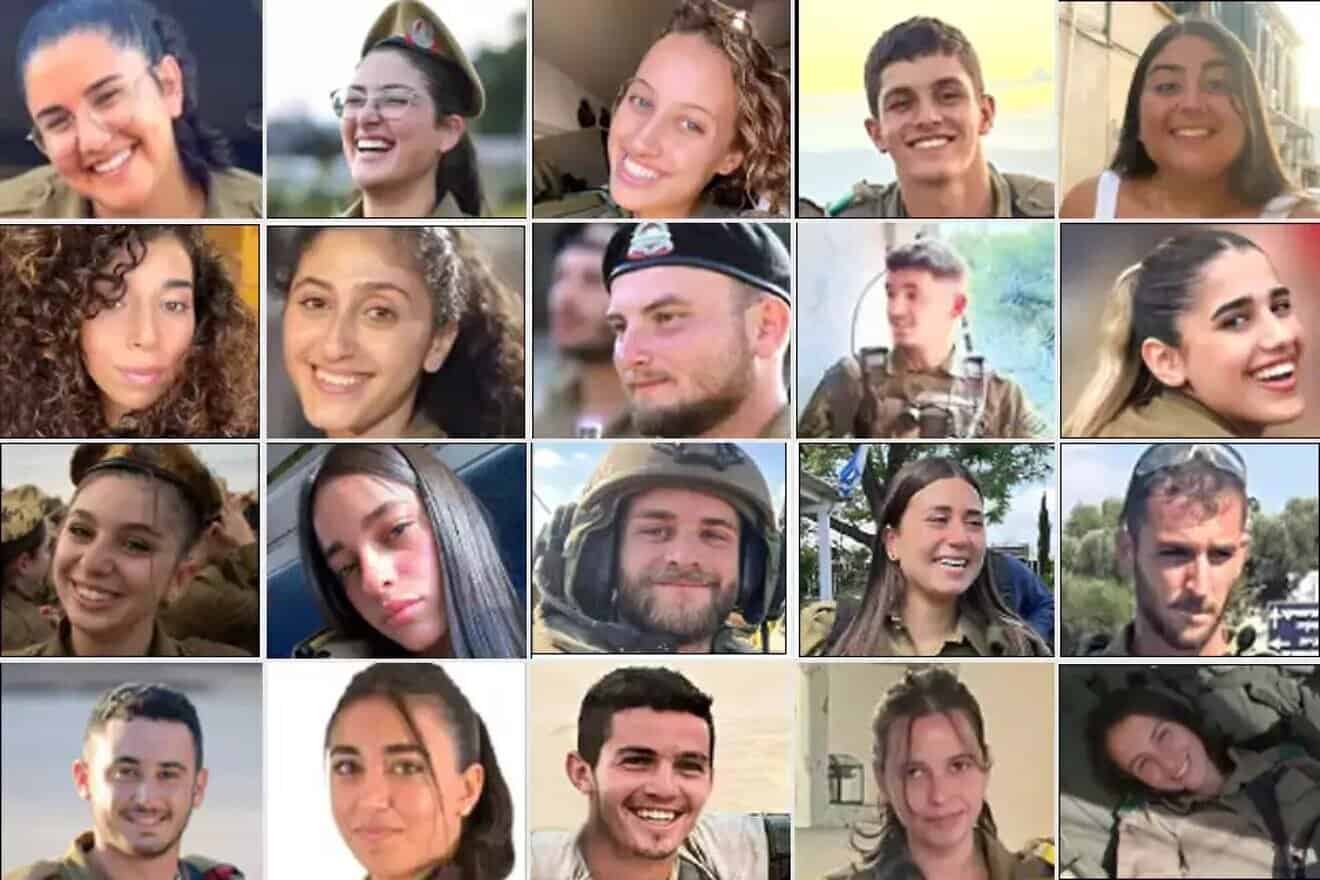
Roni Eshel, Itai Eliyahu Marciano, Noam Abramovich, Yael Leibushor, Noa Marciano, Osher Simcha Barzilay, Afik Rosenthal, Ido Harush, Noa Price, Shahaf Nissani, Gal Mishaelof, Hadar Miriam Cohen, Yonatan Golan, Shai Ashram, Shirat Yam Omar, Eden Nimri, Yam Galis, Yiftah Yavetz, Shirel Haim Pour and Shlomo Ben Nun. Credit: IDF Spokesperson’s Unit.
Conclusion
Twelve days of journey. Flights. Waiting. Challenges. They all have stickers, flags and necklaces of their fallen children with which they take photos everywhere.
They’ve tattooed mementos of their children on their bodies and feel they’re doing their post-army trip.
Crying. Laughter. Conversations about all of them. The stories want to continue being told. Yes, also conversations about politics. And the Hope Forum. And an investigation committee. And whether you go to the cemetery or avoid it.
They discuss relationships. A debate about foundations wanting to do good, but sometimes their embrace feels like a bear hug. No, they don’t want to have another child to replace the one who died. As Frida explains: “A child is not a spare part.”
I thought I was going with 20 mothers, but in practice, they were accompanied by 20 girls and boys who encouraged them and sent them signs. Yes, and the dolphins surprised them too.
The journey affected all of them. Some decided to return to work, others changed jobs. Some decided to repair relationships with partners, others began lighting Shabbat candles or sent their children to meetings with bereaved siblings.
They know returning to Israel will be challenging, but they also know they can laugh again.
Originally published by Israel Hayom.
Send Passover Packages to Needy Israeli Soldiers - Bring Them Joy!
We are honored to thank the young men and women of the IDF who risk their lives every day to protect the citizens of Israel. Soldiers have been in Gaza, Lebanon and Syria for extended periods - many are hoping to come home for Passover.
Join us in sending Passover food packages (and personal notes) to Israeli soldiers and their families.
Many soldiers spend the Passover holiday with needy families back home. The soldiers greatly appreciate your love and concern. Bring them Passover joy!
CLICK HERE TO SEND YOUR PACKAGE AND NOTE TO ISRAELI SOLDIERS!





